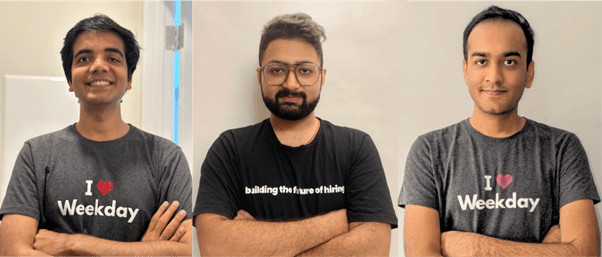Job references are an important part of hiring the right person, especially for remote positions. But the founders of Weekday say that more than 95% of recruiters don’t seek referrals from previous co-workers when assessing candidates for a position. Weekday wants to change that with a hiring platform focused on referrals and references through job seekers’ social graphs. The company launched today from stealth with $2.2 million in seed funding led by Venture Highway with participation from angel investors. Weekday was a member of YC’s winter 2021 batch.
Weekday was founded in 2021 by Amit Singh, Anubav Malik and Chetan Dalal after the three ran into challenges hiring for a previous startup. Despite all the job platforms and networking tools available, it took them three months to find their first engineer. As a result, they turned to their networks to get references, doing video calls with friends and asking them to go through their LinkedIn connections to find promising candidates. This almost doubled their candidate pipeline. Weekday was created to productize the same approach.
Singh says that Weekday did a survey of more than 200 companies’ hiring practices and found that the majority do basic background checks on candidates to see if they have a criminal record or have actually worked at the organizations on their resume. Aside from basic due diligence, however, less than 5% of companies use reference checks from previous colleagues when making hiring decisions, even though references are important for gauging things like culture fit and how well a candidate works in a remote environment.

Weekday founders Amit Singh, Anubhav Malik and Chetan Dalal. Image Credits: Weekday
Weekday makes the process of getting references central to the recruitment and hiring process. Singh says Weekday considers LinkedIn its biggest competitor because it is the world’s largest database of passive candidates. But he adds that the Recommendation feature on LinkedIn has failed to provide the kind of social data and references that companies need to make good hiring decisions, because most of them are provided by the candidates themselves.
To look for jobs on Weekday, recruiters connect their social graphs on LinkedIn or their phone contacts. Then Weekday gives them a shortlist of talent at various companies. Weekday’s shortlist is built by matching recruiter requirements, including years of experience, skills, sector and type of companies previously worked at, public academic records and proximity to company leadership. Singh say the average shortlist created by Weekday includes about 100 people, with recruiters typically picking about 10 to 12 they want to learn more about.
Once they pick their final shortlist, companies can use Weekday’s “Backchannel” feature to get background references. Weekday selects people who have worked in the same organizations as the candidate to ask (job candidates can choose to exclude their current employer from the process), then sends them automated reference forms through WhatsApp and email to make the process easier. Singh says Weekday is usually able to get references within 24 hours, before a candidate’s first introductory interview with recruiters.
Because shortlists are built through social graphs provided by users, Weekday has a large pool of passive candidates, or people who aren’t actively looking for a new job but are open to one. Weekday only collects backchannel references about them if they are shortlisted by a company and chose to be onboarded into the hiring process.
So far, more than 120 companies have used Weekday. Most of them are headquartered in the U.S., while most candidates are based in India or Southeast Asia. Singh says Weekday’s typical customers are startups hiring their early teams. There are 62,000 active job seekers, or people who have been onboarded onto Weekday, and 815,000 passive job seekers. Weekday’s goal is to work with more than 1,000 companies and hit 250,000 active job seekers, with about 2 million passive seekers, by 2025. Weekday is free for companies to try at first, and monetizes through commission-based fees that companies only pay if they end up hiring through the platform.
